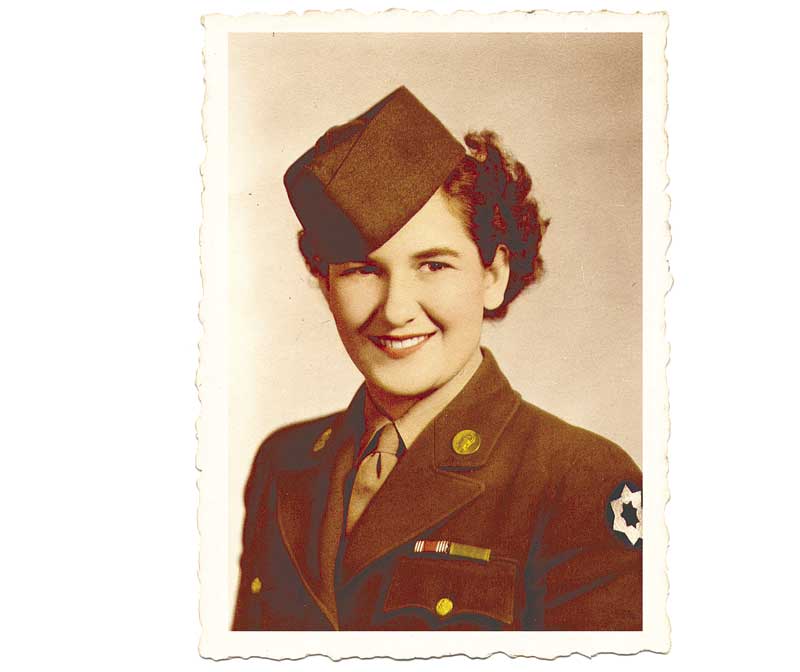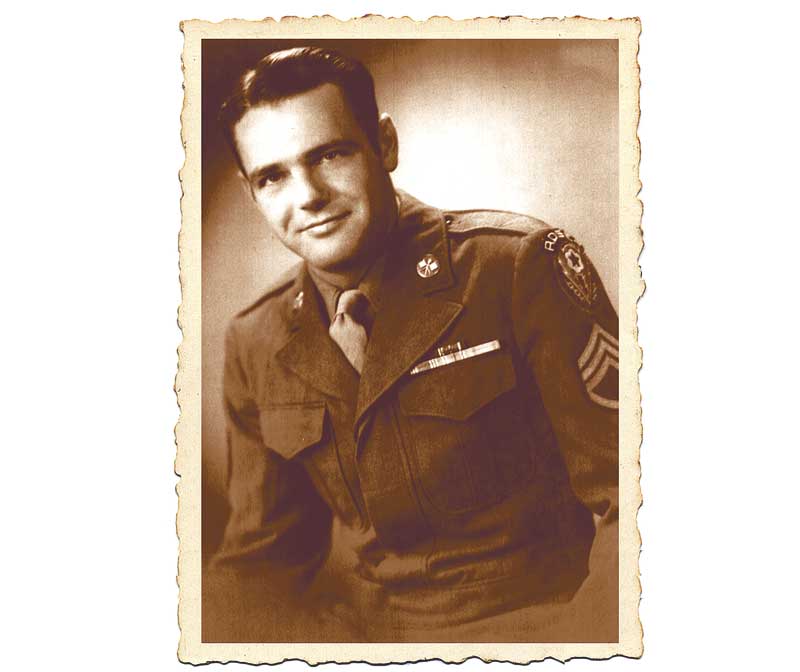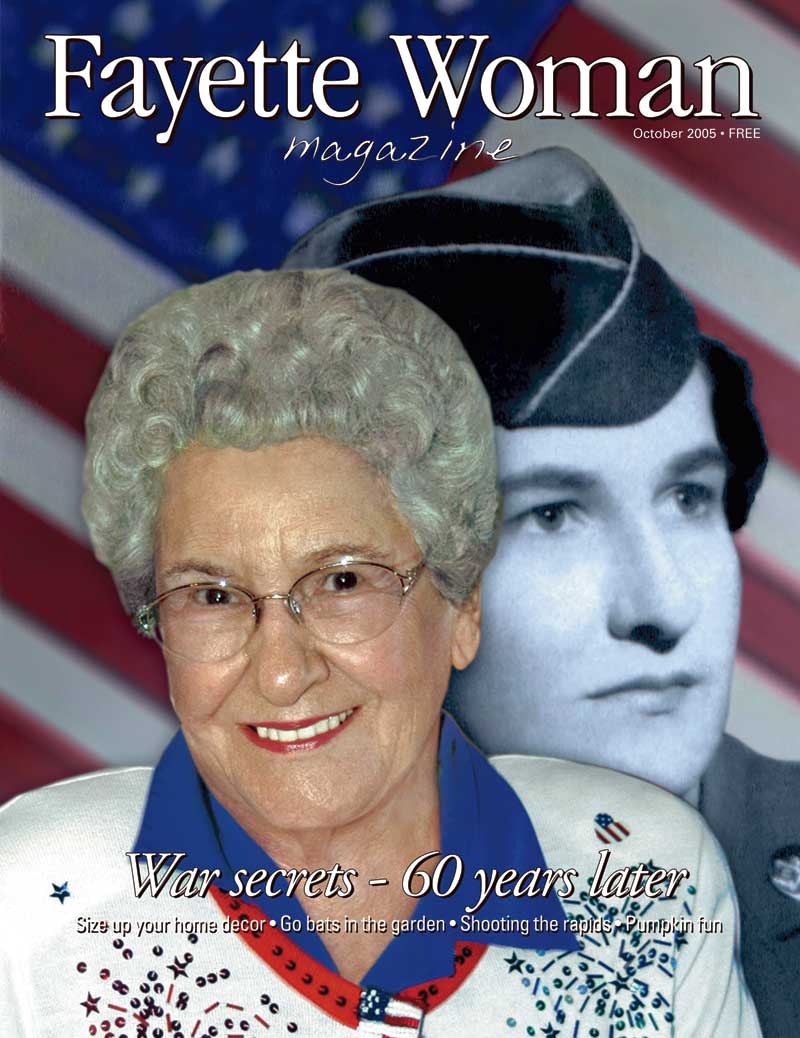The woman who typed General Dwight D. Eisenhower’s final orders authorizing the June 6, 1944 D-Day Normandy invasion in World War II died Dec. 3 in Fayetteville.
Helen Kogel Denton, 91, who kept that secret even from her husband of nearly four decades, was buried in the Jonesboro City Cemetery on Dec. 7, 2013, Pearl Harbor Day.
The short obituary said this: “She retired from Delta Air Lines where she was a secretary in the Maintenance Department. She was preceded in death by her husband Noel Denton and her son Jon Denton. She is survived by numerous extended family members and many loving friends. She was an active member of the Veterans of Foreign Wars Post #3650. She also served for many years as a volunteer for the American Red Cross.”
The Citizen’s sister publication, Fayette Woman, in October 2005 featured the story of this remarkable woman, who knew how to keep a secret — for a time, the biggest secret in the world. That story is reprinted below.
By Sherri Smith Brown
Helen Kogel Denton has led a rich and rewarding life. But she has one regret.
“I wish that I had told Noel,” she says. “It just never seemed important at the time. Our life was so full. And, I had been so conditioned to NOT tell what I had done. To forget it. And I guess that’s what I did. But, you know, I’ll see him someday — him and Jon both — and the first thing I’m going to tell them … is my story.”
The room was small – about 10 x 10 – with one long, black curtained window drawn to keep any light from filtering out to the bomb plagued streets. In front of the window sat a long table, used by various officers—two Americans, a Canadian, a Brit, an Australian. A door was on one wall; a fireplace on another, usually lit during those late winter English months.
Corporal Helen Kogel sat in the center of the room at a desk just large enough for her Royal manual typewriter and the stack of papers that were her duty to type. There was little talking except for the dictation she would take from the officers in the mornings. No one discussed with her what she was doing. But she knew.
Usually, her brown, curly head was bent over the typewriter; her hazel eyes intent on the words she typed meticulously in order not to make a mistake. She had three carbon copies to make with every page of type. Mistakes were a nuisance—just something to slow the process down even more.
For nearly eight weeks, five days a week, eight hours a day, the routine was the same. She would type from the dictation and from the stack of papers that were brought to her as the various officers came in and out. Each newly typed page was stamped TOP SECRET.
At the end of the day, the original and the three copies would be placed into four different notebooks; and the MP, who kept constant watch outside the door, would take her three sheets of carbon paper and the typewriter ribbon she had used that day and put it in the fire. After they watched it burn, the MP escorted the corporal back to her hotel on Barclay Square and she would join the rest of her fellow WACs for dinner.
She told no one of her assignment and no one asked where she spent her days. After all, they were all part of General Dwight D. Eisenhower’s staff, it was 1944 during World War II, German bombs were falling on London, and their work was top secret.
One day in late April, Corp. Kogel typed the last page of her assignment. One of the officers placed the pages into their respective notebooks, which were several inches thick by now, and said, “Would you like to go with us to take this to Gen. Eisenhower?”
The corporal had worked as a secretary on the General’s staff for nearly a year, but had never spoken to him, only saluted from a distance. She was honored to go to his office.
“Corporal, do you know what you’ve typed?” asked Gen. Eisenhower. Corp. Kogel said, “Yes, sir. These are the battle plans that you will use for the invasion of France.”
Corp. Helen Kogel, a 23-year-old from South Dakota, had just become a part of history. She had typed the complete battle plans for the invasion of the Normandy Coast and the liberation of Europe — Operation Overload, D-Day. And she was unable to confide in anyone.
She knew the number of ships, aircraft and men, what units would be deployed, where each army involved would land. She knew ship movements, people movements. Where planes would drop bombs. She knew that the 101st Airborne – where two hometown friends served – would go in first to cut railroad lines, blow up bridges, and seize landing strips. She knew everything except the date it would begin. But she guessed it would be soon. And she could not discuss with it with anyone, in fact, she was told to forget what she had typed.
Below, Helen Denton pictured during the war.

When hundreds of Allied planes began flying over London day and night toward the coast, she suspected that the invasion might be beginning but said nothing. Even when she heard Sir Winston Churchill speak on the radio on June 6, and realized that Gen. Eisenhower, supreme commander of the United States Army, was setting in motion the Allied Invasion of Europe, the greatest military operation the world has ever known, she did not confide her knowledge to anyone.
As the Allied troops stormed the Normandy beaches, Corp. Kogel and the rest of Gen. Eisenhower’s staff made preparations for going to France themselves. General Eisenhower would need his office staff as soon as possible after the Allied forces got to Paris.
German V-1 bombs were making life in London hellish, and the 30-girl staff was sleeping three floors underground in bunkers at night. It would be safer to get to France.
A few days before her departure, Corp. Kogel arrived at a telegraph office to wire her parents not to send any more mail to her until she contacted them again with a new address.
Suddenly, a “V-1” bomb whistled overhead, the sound stopped suddenly — an indication that the bomb was on top of you and about to drop — and the office where she stood blew up. The force knocked her down and out. She awoke screaming with shattered glass covering her entire body and someone shaking her, telling her she was going to be OK.
A few days later, Corp. Kogel’s WAC unit left London for Southampton, where they boarded a Navy transport ship and crossed the English Channel in the dark of night with lights out. When the ship was within a few miles of Utah Beach, Corp. Kogel’s unit was told to put on their knapsacks, climb over the ship’s rail and down the gigantic ship’s rope ladder to a smaller landing craft on the water that would take them as close to the beach as possible.
Like the troops just a few weeks before them, the women walked out of the landing craft into waist high water toward the flatness of Utah Beach. This time, however, there were no bombs blowing up around them — only the red glow and sound of gunfire in the distance.
Told not to move once they reached the beach, Corp. Kogel and her group sat until daybreak when a truck came from the base camp. Standing in line for mess and still wet from their landing, she remarked to a friend that she would be happy to get some dry clothes and wondered how soon they would be able to get their personal bags that had been floated to shore. A young sergeant standing behind her offered to get a jeep and take them to find the bags. His name was Noel Denton.
For the next six weeks, Corp. Kogel and the other 29 women lived on Utah Beach in two-person tents in a special holding area. During that time, she listened for daily news from the front line, which was just a few miles away, ate meals with the troops, watched Bing Crosby and Bob Hope from the back of a pickup truck for hundreds of troops at Utah Beach, walked on the beach around her area, heard that Paris had been liberated … and fell in love.
*******
A diminutive, silver-haired Helen Kogel Denton sits on the couch in her Fayetteville home. “Noel was a staff sergeant in the Signal Corps. He and his men would go into towns after they had been taken by the Allied forces and set up telephone wires then come back to the base camp at night. They were also waiting to go to Paris to set up lines in Gen. Eisenhower’s office so they could talk to London and Washington.”
Dating on a Normandy Beach during the invasion of France was not easy, but the couple found a way. “We would walk out to a little farm that had apple juice and Cognac,” reminisces Helen, “and we would sit on a log and drink and talk….”
Gen. Eisenhower’s staff was flown into Paris as soon as it was liberated on August 25, 1944. The tall, handsome Sgt. Denton was there, too – for about three weeks. Then the romance was confined to telephone calls from the front lines and weekend passes to Paris.
Below, Helen’s husband, Noel Denton.

Liberated Paris was a wonderful experience for Corp. Kogel who loved to dance at the USO, visit museums and travel the countryside. She witnessed the lights coming back on in Paris from the rooftop of her hotel as well as the V-Day Celebration. “The day after the lights were turned on, we marched in a parade down the Champs Elysees,” said Helen, proudly showing a photo of her unit marching as throngs of Parisians cheered. “We polished our shoes and our buttons and pressed our uniforms. It was thrilling.”
With a story like that, Helen, who was raised on a South Dakota farm, says she knew when she returned home in October of 1945 after the war was over, that she was not going to be a farmer’s wife. So did Noel Denton.
He had grown up in College Park and returned to the job he had with Southern Bell in Atlanta before the war. A few months later, Noel traveled to South Dakota to ask for Helen’s hand in marriage — a marriage that would continue the love that had begun on a beach in Normandy during the D-Day invasion.
Helen and Noel spent 36 wonderful years together, living in Clayton County where they raised show Collies, a passion of Noel’s. In 1954, the couple adopted a 5-month-old baby, Noel Jonathan Junior, who became the center of their life.
With Jon in tow, the Dentons traveled the country showing Collies they had raised at their Deep South Kennel in Clayton County. In 1967, with Jon in junior high school, Helen went to work for Delta Air Lines where she was employed until she retired 15 years later.
As an employee of Delta, Helen took the opportunity to travel with Noel and Jon, going back often to London and Paris as well as Germany, Belgium and other parts of France, including Normandy and Utah Beach.
But in all their years together, and their trips abroad, Helen never told Noel — nor anyone else — about the role she had played in history.
In 1982, Helen and Noel lost Jon in an accident and a few months later, Helen’s beloved Noel died from a heart attack.
“You know, they are gone, but they’re still with me,” says Helen, pointing to the wall of photos next to her bed. “I see them first thing every morning and the last thing every night,” she smiles. “And I have a lot of memories.”
After his retirement from Southern Bell, Noel had become the treasurer of the Collie Club of America and an accredited AKC judge, traveling around the country and the world. Helen carried on his dream by fulfilling his position as treasurer of the club and, later, being elected president of the club’s foundation.
“I had to do something. I had to keep going,” she says. Volunteering became a priority in Helen’s life. She has served as Post Commander of the Riverdale Chapter of the Veterans of Foreign Wars for the past eight years and District Commander of that same organization.
She is an active member of the Delta Pioneers – an organization of retired Delta employees – raising funds for The March of Dimes, United Way, CARE and Cancer drives. She has served on the Red Cross Speakers Bureau, on the South Metro Advisory Committee and is a member of the Office of Volunteer Administration.
Plaques and proclamations attest to the time she has spent helping others: recipient of the DAR Community Service Award, the Clara Barton Award of Meritorious Service, the Martin Luther King, Jr. Center for Non-violent Social Change Award. A letter from President Bill Clinton congratulates her on being nominated for the Golden Rule Award for community service.
But not until 1994 and the 50th anniversary of D-Day did Helen tell anyone that she had typed the battle plans for the invasion.
“A friend asked what women had done during WWII and if any women were involved in the invasion and I mentioned it,” remembers Helen. The next thing she knew, the friend had called a local TV station and from that she was asked to speak about her experiences at Fort Gillem.
And as Helen says, “I’ve been telling my story ever since.”
Helen says the more she speaks about her experience, the more she realizes how much she wants people to know that women served in WWII and played a significant part. She frequently speaks at civic functions and at area schools where she takes her medals and dog tags to show students. She is often the topic for media coverage, most recently interviewed by NBC. In 2004, she traveled to Washington, D.C., to participate in the World War II Memorial dedication.
She says one of her biggest thrills was speaking before a couple hundred people at Fort McPherson this past June. On Nov. 5, 2005, the city of Riverdale will name a street in her honor followed by her participation in the city’s Veteran’s Day Parade.
“I’m a very lucky woman. A very lucky woman,” she says.
[This story originally appeared in the October 2005 Fayette Woman, the cover of which is shown below.]

[CORRECTION — The flying bombs employed by the Germans to bombard England consisted of two types: the earlier V1 “buzz bomb,” powered by a jet engine (hence the “buzz), and the later V2, a ballistic missile, powered by a rocket motor, which gave no audible warning of its impact. The earlier version of the story misidentified the bomb type, and has been corrected in the text.]












Leave a Comment
You must be logged in to post a comment.